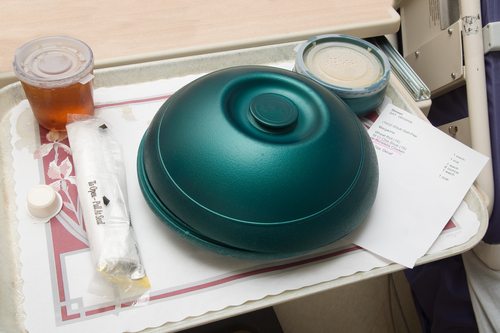
Rob Byron / Shutterstock.com
June 23, 2014;The Guardian
A 4.5/5 rating on Yelp, a focus on farm-to-table fresh food, organic grain-fed beef, and 1500 patient food trays a day. Does this sound like your average cafeteria in a medical center? According to a recent article in the Guardian, the “Moffitteria” or Moffitt Café, is the main dining hall of the University of California at San Francisco (UCSF) Medical Center. Seven years ago, a partnership with the nonprofit Physicians for Social Responsibility began a focus on providing food choices that were “tasty, healthy and good for the environment.”
Food service reps from several SF area healthcare systems came together to pool their purchasing power. They sought higher quality ingredients, and more organic and sustainable foods. “We need to lead by example, because we are a teaching institution,” says Jack Henderson, the food service project manager.
Health Care Without Harm, a global coalition for environmentally responsible healthcare, also joined in the meat-reduction campaign, with almost 500 hospitals nationwide.
Sign up for our free newsletters
Subscribe to NPQ's newsletters to have our top stories delivered directly to your inbox.
By signing up, you agree to our privacy policy and terms of use, and to receive messages from NPQ and our partners.
This year, the UCSF Medical Center spent approximately 25 percent of its $5.3 million food budget on sustainable edibles, such as organic yogurt, cage-free eggs, and antibiotic-free chickens. The collective strategy of the hospitals is to “put enough gentle pressure” on local food distributors and suppliers.
“When the largest healthcare facilities in a region pool their purchasing dollars to ask for an aggregated volume of a particular organic food item, they can be incredibly influential,” says Lucia Sayre of Physicians for Social Responsibility.
An example of “gentle pressure?” Concern over medication overuse of livestock led the university health care system to decide to purchase only antibiotic-free meats. The current contract meant that the food distributor would remain the same. By joining with six area hospitals and using volume purchasing power, UCSF medical center was able to negotiate a workable price for organic meats.
Another example is the partnership with Community Alliance with Family Farmers. This nonprofit organization, which advocates for California’s family farmers and sustainable agriculture, created an alliance that allowed the six hospitals to purchase pesticide-free strawberries, squash and other vegetables from local family farms. Everyone benefits, as the financial commitment from the large hospitals allows the farmers to better plan ahead.
Sayre, of Physicians for Social Responsibility, hopes that other healthcare institutions will develop the joint purchasing programs and begin to shift the marketplace towards healthier, local, organic and sustainable foods. Currently similar programs have started up in Los Angeles, Portland, San Diego, and New England.
Don’t forget to check out the Yelp ratings the next time you dine in at the local farm-to-table hospital cafeteria.—Jeanne Allen













